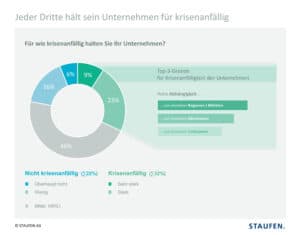
One in three top managers at medium-sized industrial companies in Germany considers their own company to be highly prone to crises. Above all, the high level of dependence on individual regions or markets is a source of concern for many bosses in Germany. Only one in five business leaders considers their company to be absolutely crisis-resistant. These are the results of the “2018 Restructuring” study. Business consultancy Staufen surveyed 244 board members and managing directors of medium-sized industrial companies.
“The latest warnings from IMF Chief Economist Maurice Obstfeld and BDI President Dieter Kempf raise fears that this self-assessment of Germany’s industry could face a reality check more quickly than was assumed just a few months ago,” says Andreas Sticher, Partner at business consultancy Staufen. “As our study shows, mechanical and plant engineering in particular are greatly dependent on individual regions or markets. Considering current trade conflicts, tension is likely to increase in many companies and among their financiers.”
However, regardless of economic fluctuations and political stability, even established companies that are (still) seeing good earnings are constantly faced with the challenge of securing their existing success, while managing the transition to new business models and structures. “The industrial revolution 4.0 is in full swing and nowhere near all companies are currently in a position to reinvent themselves,” says restructuring expert Sticher.
According to the current study from Staufen, 59 percent of German industrial companies regularly run through crisis scenarios and discuss possible countermeasures. But this does not go far enough for Staufen consultant Sticher: “The goal must be a genuine change in mentality. It is important for companies not to just react to a crisis in the future when it may already be too late but rather to recognize early indicators and quickly react to them.”
This approach of so-called predictive restructuring is increasingly in demand by banks and investors. After all, their credit default rates and investment returns depend largely on companies not tumbling into a crisis without any preparation but rather taking the reins early enough and with foresight. “In the past, restructuring projects were only in demand when a company was already in a financial crisis. This idea today, however, clearly does not go far enough,” Staufen Partner Sticher is convinced.
Mechanical Engineering Congress on November 6th at SEW-EURODRIVE in Bruchsal
The field of mechanical engineering is undergoing a serious transformation. Digitization is increasingly determining company-owned processes, while also opening up new business opportunities. Many companies, however, are still highly uncertain about the benefits of digitization and the success of new business models. The Mechanical Engineering Congress organized by Staufen AG in cooperation with SEW-EURODRIVE therefore focuses on the following questions: How does mechanical and plant engineering approach this transformation process? How do companies develop smart products and new business models? And how do they implement them – also in an international context?
On November 6, 2018 in Bruchsal, decision-makers from the mechanical and plant engineering industry will present benchmark examples from their organizations with reports on their experiences, lessons learned and success stories. All Information about the event: www.maschinenbaukongress.de


